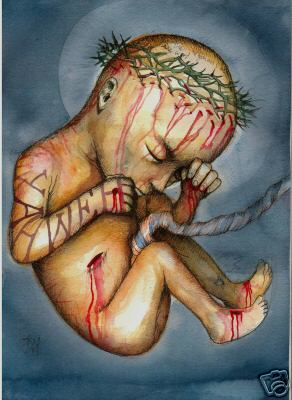Why we Celebrate Tonight
As you read this Gayle, Reuben and I will be returning home from Church, ready to celebrate the birth of Jesus. As dusk has fallen, in the Central European Tradition, we will read the nativity story, sing worship and open our presents.
This year I have consistently preached that the only reason to celebrate the birth of this child is if you realise what he will accomplish, and how he will accomplish it. Therefore, my Christmas gift to you this year is that fantastic picture that I found on the internet. May you have a blessed time as you too celebrate the wonder of what this child will, indeed has acheived.
 |
| Mild he lays his glory by, Born that man no more may die, Born to raise the sons of earth, Born to give us second birth. |
Love the picture. Do you know the original source?
cosmic child abuse gone embryionic!
Where is the nativity, where is the life, where is the resurrection, where is Christ in glory? This picture represents an understanding of the Gospel devoid of so much of the theological richness of the life of Christ. We might as well keep Good Friday every day of the year, and be done with it.
Sorry Peter, my bluntness reflects my horror at this picture on a day when we celebrate birth and not death, glory and not gore!
Have you thought about it putting on a Christmas Card? I am sure your friends and family would love it.
Pax, Winston.
Oh absolute rubbish Winston!!
The picture doesn’t deny any of those things, it simple focusses our minds on the fact that Jesus was born to die, and to die for us. Are you seriously suggesting that your nativity readings omit the magi’s third gift?
I think putting it on a (controversial) Christmas Card is a brilliant idea…
I think you should go for the card idea! Possibly, put it through all the doors in your parish, inviting people to carol services. It would be fascinating to see the results.
I agree that the picture does not deny any of the things that I have mentioned. However, it is what it affirms to the detriment of all the other things about the incarnation which concerns me. It also concerns me that during this great season of Christmas followed by Epiphany and Candlemas that the one image that you choose to tell your readers why we should celebrate Christmas is an image that belongs to Good Friday. Thank God, the great writers, artists, and musicians of the Christian Church have had far greater imagination than this in their artistic creations for this holy season, and ultimately a more incarnational model of the life of Christ.
Of course, not surprisingly, I stand by my first sentence of my initial posting – ultimately, the picture reflects a picture of the atonement as God the child abuser that owes more to the minds of a few Reformed theologians with a splash of Mel Gibson than the Gospel of Jesus Christ.
Pax, Winston.
*sigh*
The picture I chose to show on Christmas Eve was that of the lamb slain from before the beginning of time. How you get from there to an assumption that I have a deficient incarnational theology is, frankly, beyond me.
Peter,
Certainly, later reflection focused on the Jesus being “slain before the foundations of the world” and the eternal “logos” coming to be in Jesus; and these are very important and right and true. But if I may be so bold, the Gospel birth narratives only hint at what Jesus will accomplish and how. In fact, I don’t suppose Jesus even knew for sure what his “game plan” would be until after his “Temptation.” Whether we take the desert time literally or figuratively.
Jesus future was certainly filled with promise: “He will save his people from their sins.” But crucifixion and resurrection? That is just not there in the infancy narratives.
But, lets not fight too much on the significance of Jesus; I’m sure we agree on that!
Tony
Hi Tony,
I think we are allowed though a portion of theological reflection in our proclamation of the incarnation. I’m quite happy with the idea that the infant Jesus had absolutely no idea all that was going to happen to him (and it would be a fascinating debate to explore whether he ever did and if so at what point), but that doesn’t stop us celebrating that which we know retrospectively to be true.
I remember a great conversation with a member of my congregation, a leading Messianic Jew, after I had preached on Ecclesiastes 9 and connected it to the work of Jesus. My friend gently criticised me afterwards for not letting the text speak what it spoke and instead referring to Jesus. I replied by saying that he viewed the text through his genes, so he had an investment in the passage as a Jew. I on the other hand also read the text through my genes, but as a Gentile I only came to believe in its inspiration through the truths revealed in the New Testament and experienced personally. Who had the right approach? Probably both of us.